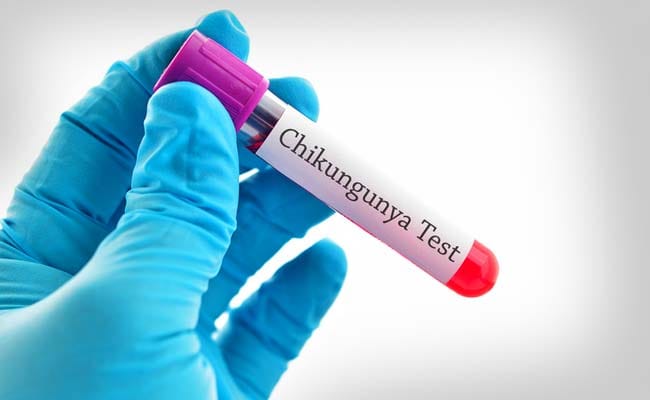
Chikungunya is a mosquito-borne virus that is characterised by fever and severe joint pain.
Houston:
Scientists have developed the first vaccine for chikungunya fever made from an insect-specific virus that does not have any effect on people, making it safe and effective.
The newly developed vaccine quickly produces a strong immune defence and completely protects mice and nonhuman primates from disease when exposed to the chikungunya virus, researchers said.
"This vaccine offers efficient, safe and affordable protection against chikungunya and builds the foundation for using viruses that only infect insects to develop vaccines against other insect-borne diseases," said Scott Weaver, professor at The University of Texas Medical Branch at Galveston (UTMB) in the US.
Chikungunya is a mosquito-borne virus that causes a disease characterised by fever and severe joint pain, often in hands and feet, and may include headache, muscle pain, joint swelling, or rash.
Some patients will feel better within a week but many develop longer-term joint pain that can last up to years.
Death is rare but can occur, researchers said.
Traditionally, vaccine development involves trade-offs between how quickly the vaccine works and safety.
Live-attenuated vaccines that are made from weakened versions of a live pathogen typically offer rapid and durable immunity but reduced safety.
On the other hand, the inability of inactivated vaccines to replicate enhances safety at the expense of effectiveness, often requiring several doses and boosters to work properly.
There may be a risk of disease with both of these vaccine types, either from incomplete inactivation of the virus or from incomplete or unstable weakening of the live virus that is only recognised when rare vulnerable individuals develop disease.
To overcome these trade-offs, the researchers used the Eilat virus as a vaccine platform since it only infects insects and has no impact on people.
The UTMB researchers used an Eilat virus clone to design a hybrid virus-based vaccine containing chikungunya structural proteins.
The Eilat/Chikungunya vaccine was found to be structurally identical to natural chikungunya virus. The difference is that although the hybrid virus replicates very well in mosquito cells, it cannot replicate in mammals.
Within four days of a single dose, the Eilat/Chikungunya candidate vaccine induced neutralising antibodies that lasted for more than 290 days. The antibodies provided complete protection against chikungunya in two different mouse models.
In nonhuman primates, Eilat/Chikungunya elicited rapid and robust immunity - there was neither evidence of the virus in the blood nor signs of illness such as fever after chikungunya virus infection, researchers said.
The findings were published in the journal Nature Medicine.
(This story has not been edited by NDTV staff and is auto-generated from a syndicated feed.)
The newly developed vaccine quickly produces a strong immune defence and completely protects mice and nonhuman primates from disease when exposed to the chikungunya virus, researchers said.
"This vaccine offers efficient, safe and affordable protection against chikungunya and builds the foundation for using viruses that only infect insects to develop vaccines against other insect-borne diseases," said Scott Weaver, professor at The University of Texas Medical Branch at Galveston (UTMB) in the US.
Chikungunya is a mosquito-borne virus that causes a disease characterised by fever and severe joint pain, often in hands and feet, and may include headache, muscle pain, joint swelling, or rash.
Some patients will feel better within a week but many develop longer-term joint pain that can last up to years.
Death is rare but can occur, researchers said.
Traditionally, vaccine development involves trade-offs between how quickly the vaccine works and safety.
Live-attenuated vaccines that are made from weakened versions of a live pathogen typically offer rapid and durable immunity but reduced safety.
On the other hand, the inability of inactivated vaccines to replicate enhances safety at the expense of effectiveness, often requiring several doses and boosters to work properly.
There may be a risk of disease with both of these vaccine types, either from incomplete inactivation of the virus or from incomplete or unstable weakening of the live virus that is only recognised when rare vulnerable individuals develop disease.
To overcome these trade-offs, the researchers used the Eilat virus as a vaccine platform since it only infects insects and has no impact on people.
The UTMB researchers used an Eilat virus clone to design a hybrid virus-based vaccine containing chikungunya structural proteins.
The Eilat/Chikungunya vaccine was found to be structurally identical to natural chikungunya virus. The difference is that although the hybrid virus replicates very well in mosquito cells, it cannot replicate in mammals.
Within four days of a single dose, the Eilat/Chikungunya candidate vaccine induced neutralising antibodies that lasted for more than 290 days. The antibodies provided complete protection against chikungunya in two different mouse models.
In nonhuman primates, Eilat/Chikungunya elicited rapid and robust immunity - there was neither evidence of the virus in the blood nor signs of illness such as fever after chikungunya virus infection, researchers said.
The findings were published in the journal Nature Medicine.
(This story has not been edited by NDTV staff and is auto-generated from a syndicated feed.)
Track Latest News Live on NDTV.com and get news updates from India and around the world

